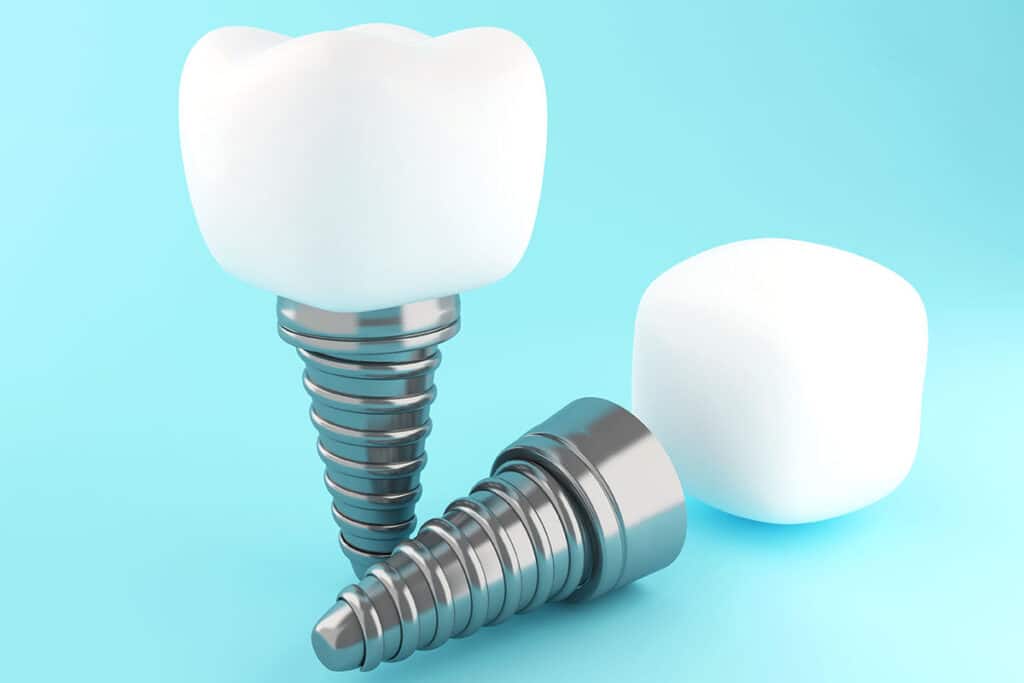Dental Implants
in Burlington
Our dental implants will transform your smile and your life.

Dental Implants
in Burlington
Our dental implants will transform your smile and your life.
What are dental implants?
Dental implants are artificially created tooth roots made from titanium. These are inserted into your jawbone, acting to replace the root of a missing tooth so that a new artificial tooth can be attached. The procedure may be performed by your dentist or you may be referred to a specialist such as an oral surgeon or periodontist.
If your smile is missing one or more teeth, dental implants may be the solution to replace them. Implants can be used to replace the missing roots of your teeth and act as supports for artificial replacement teeth. Dental implants offer amazing comfort, look like your natural teeth, and will have a profound effect on your self-confidence.
Am I a candidate for dental implants?
To be a candidate for dental implants you should be in good general health, have healthy gums and your jaw must contain enough bone structure to securely hold an implant. Often, due to missing teeth and degradation, patients do not have enough natural jawbone left for implants to work, in which case a bone graft may be required to build up the bone. Speak with your dentist at our Burlington office to find out if you’re a candidate for dental implants.
Benefits of dental implants
Dental implants are the treatment of choice when it comes to replacing teeth and restoring your smile. Implants offer many benefits to our patients which include:
Dental implants properly support replacement teeth like a natural tooth
Dental implants can replace a single tooth or multiple missing teeth
Artificial teeth are not subject to tooth sensitivity or cavities
Dental implants are comfortable and fit perfectly, unlike loose or wobbly dentures that slip from their position inside your mouth
Implants avoid the risk of damaging adjacent teeth in comparison to other methods of tooth replacement
Dental implants restore full functionality of chewing
Dental implants reduce facial sagging caused by missing teeth
Dental implants help restore proper speech function
Your new smile will help boost your confidence
Getting a new smile is easier than you think

1. Implant is inserted into the bone
A dental implant procedure at our Burlington office begins with inserting the implant into the bone of your jaw. This is done surgically as an area of your gums will need to be opened to access the bone structure underneath. Sedation dentistry is often used during this initial phase.

2. Healing process of the bone
Once the implant has been installed the next step is to wait for osseointegration to take place. This is the process where your jawbone grows around and into the implant to solidify it in the structure of your jaw. This process takes several months but will leave you with a solid base that’s ready to anchor your new artificial teeth.

3. Abutment is placed on the implant
Once the implant has been securely embedded in your jawbone, an abutment can be attached, This is the piece where the crown (artificial tooth) will eventually be attached. This procedure requires a minor surgery to remove the gums in the implant area, the abutment to be attached, and the gum tissue to be closed around the abutment. Local anesthesia or sedation dentistry are often used to take away any pain associated with this step.

4. Ceramic Crown is placed
Once your gums have healed around the abutment, it’s time to attach your new artificial teeth. By this step you will have had impressions of your existing teeth made so that custom-fitted, realistic looking crowns (artificial teeth) can be made that are ready to attach. There are both removable and fixed options available, so speak to your dentist about which option is right for you.
Questions to ask your Burlington dental implant specialist
What are dental implants, and how do they differ from other tooth replacement options?
What are the benefits of dental implants, and how long do they typically last?
What is the success rate for dental implant procedures?
What is the expected recovery time after getting dental implants, and what can I expect during that period?
What are the potential risks and complications associated with dental implants, and how are they managed?
Will I require any additional treatments or procedures before or after getting dental implants?
What type of anesthesia will be used during the procedure, and what are the risks associated with it?

What is the cost of the dental implant procedure, and what payment options are available?
What type of implant material do you recommend, and what are the pros and cons of each option?
Are there any lifestyle changes or adjustments that I will need to make after getting dental implants?
How often will I need to have my dental implants checked, and what does maintenance involve?
What are the alternative tooth replacement options that are available to me, and how do they compare to dental implants?
Financing options for dental implants are available
Our office understands that the cost of dental implant procedures can be a significant concern for patients. To help address this issue, we offer multiple financing options to ensure patients can access the treatments they need. With these financing options and direct insurance billing, Martindale Dental aims to make dental care more affordable and accessible to all patients, without compromising on quality.
